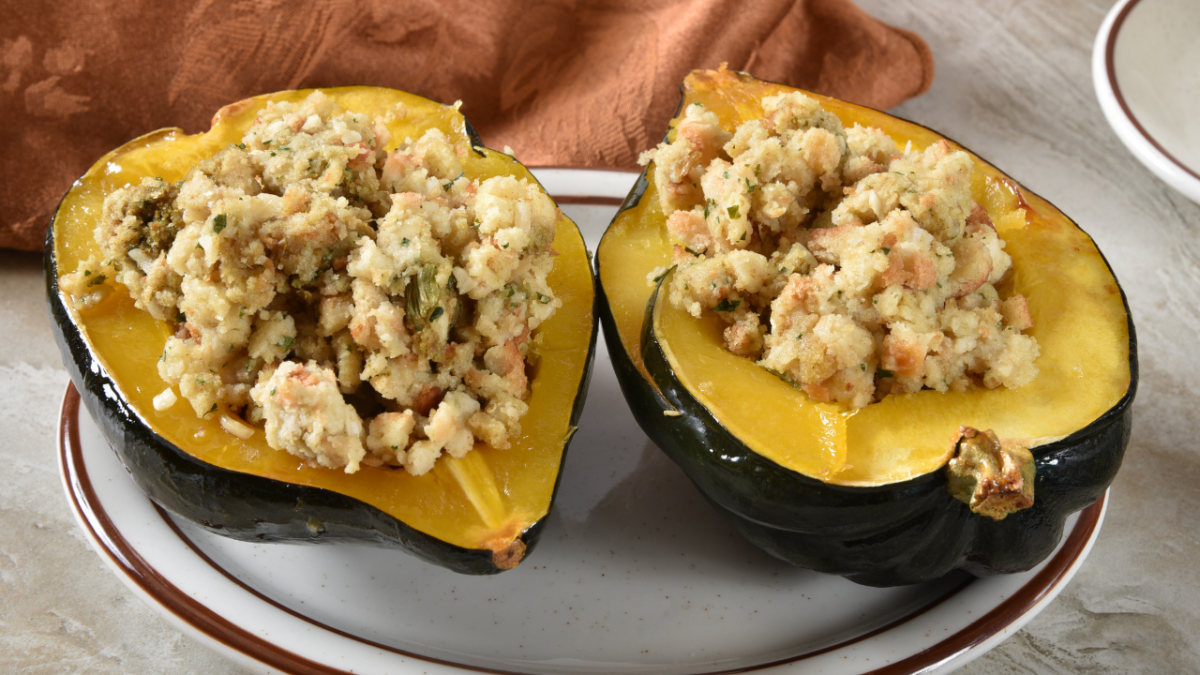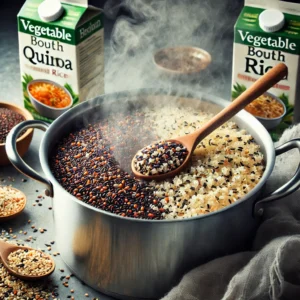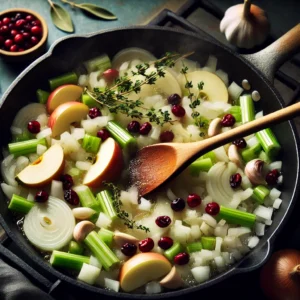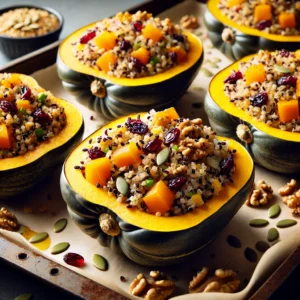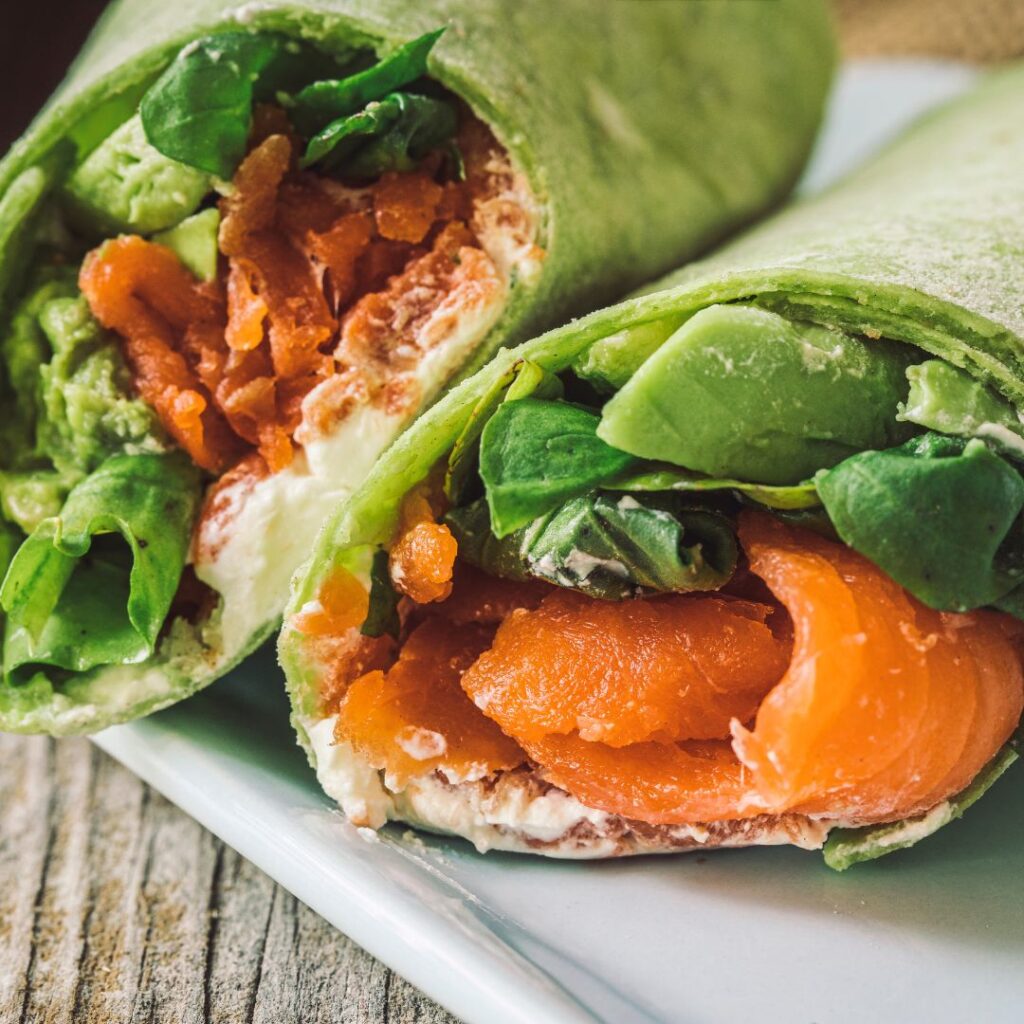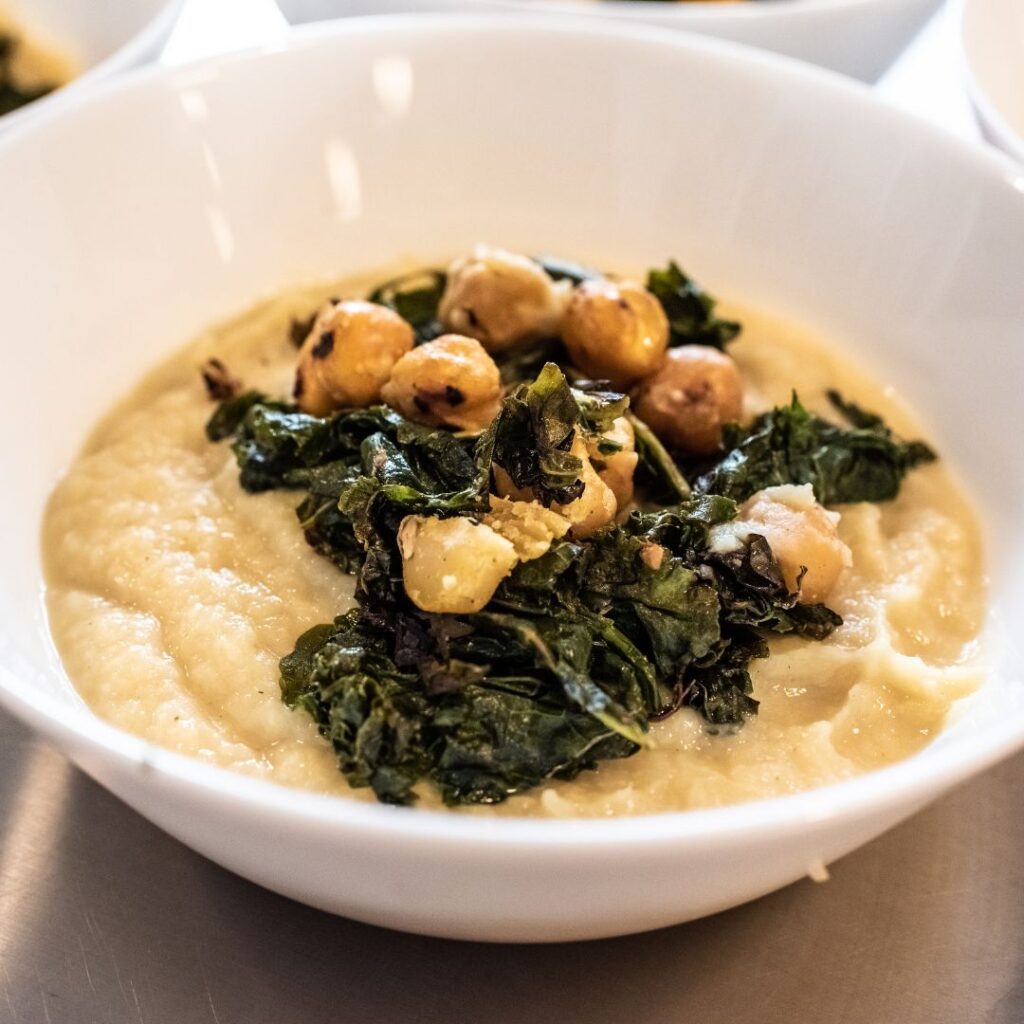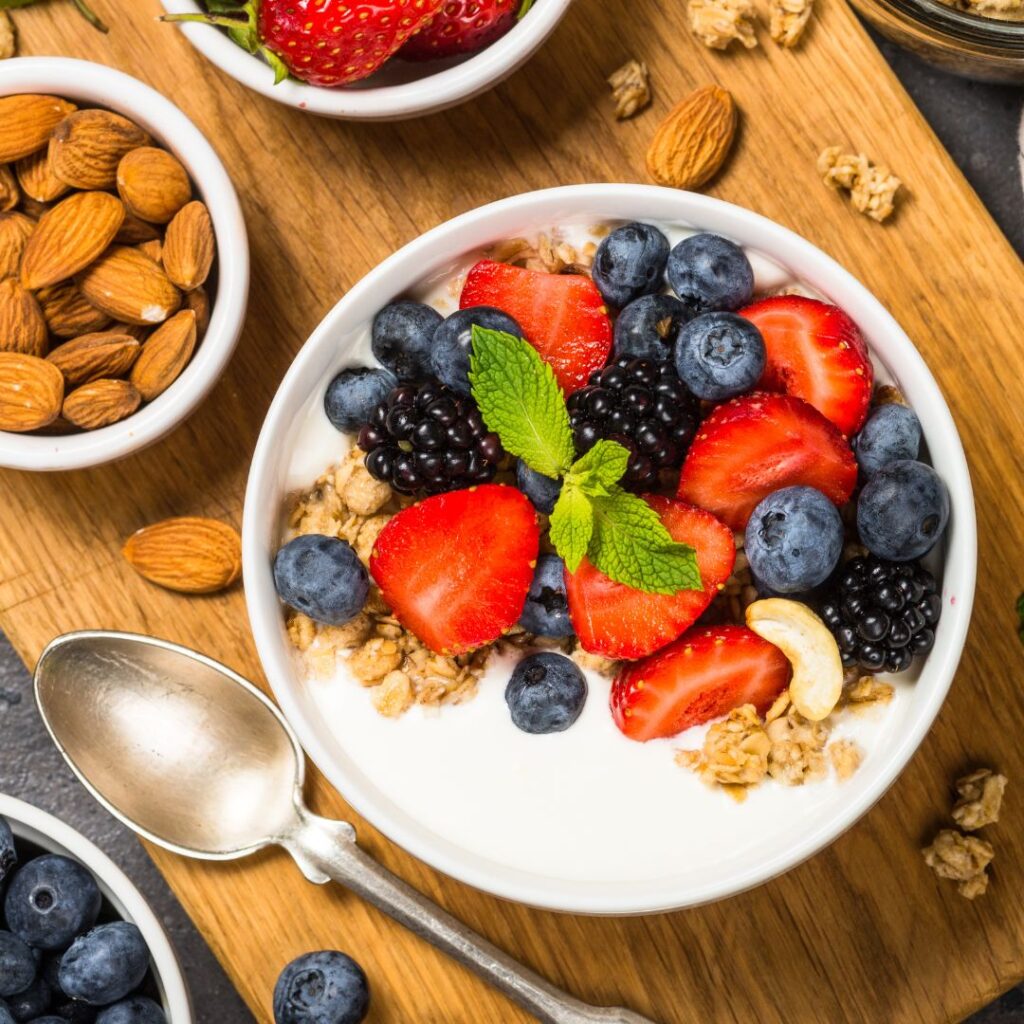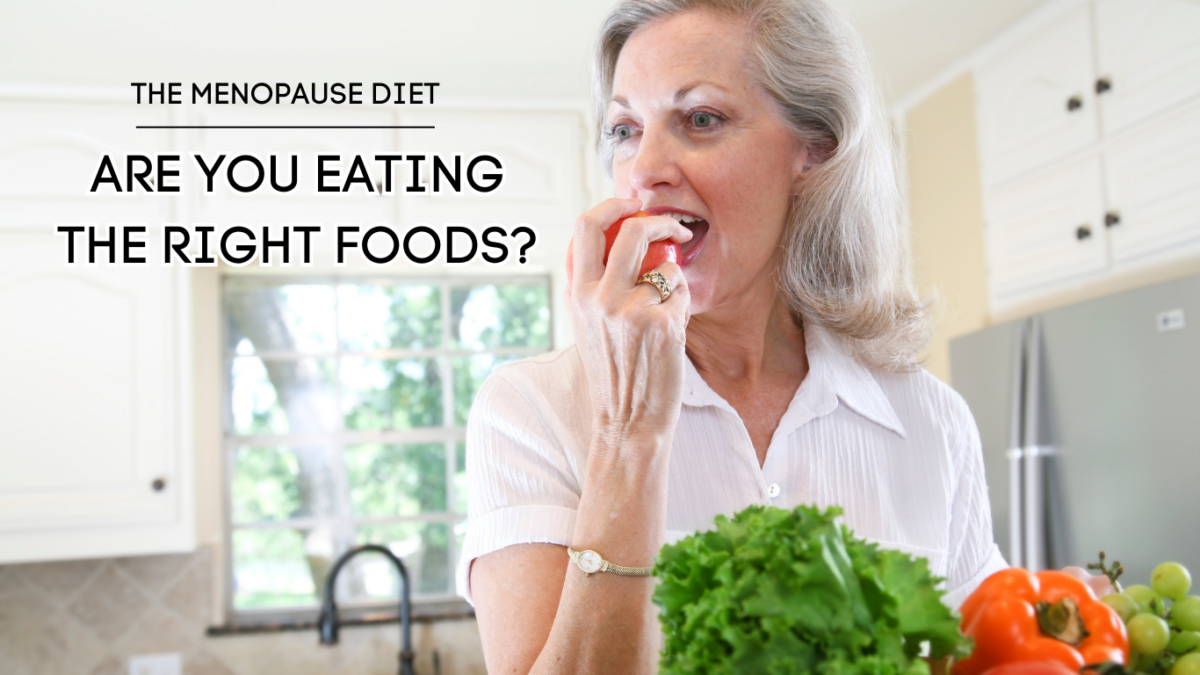Gourmet Holiday Turkey in Roasted Acorn Squash Bowl
Gourmet Holiday Turkey in Roasted Acorn Squash Bowl
Equipment
- Baking sheet for roasting the squash
- Parchment paper to prevent sticking
- Large skillet for cooking quinoa and wild rice
- Mixing bowl
- Measuring cups and spoons
- Knife and cutting board
- Garlic press optional, for minced garlic
- Spoon or ladle for stuffing the squash
- Oven
Ingredients
Acorn Squash Bowls
- 2 large acorn squash halved and seeds removed
- 1 tbsp olive oil
- ¼ tsp salt
- ¼ tsp black pepper
Mixed-Grain Stuffing
- ½ cup quinoa or farro for added texture
- ½ cup wild rice
- 1 tbsp olive oil
- 1 medium onion diced
- 2 cloves garlic minced
- 1 celery stalk diced
- 1 small apple chopped; with skin for added fiber
- ¼ cup dried cranberries unsweetened
- ¼ cup walnuts roughly chopped, optional
- 1 tsp dried sage
- 1 tsp thyme
- ¼ tsp cinnamon
- 1 ½ cups vegetable broth low sodium
- Salt and pepper to taste
Optional Topping
- 2 tbsp pumpkin seeds or sunflower seeds
Instructions
Prepare the Squash Bowls:
- Preheat the oven to 400°F (200°C).
- Brush the inside of the squash halves with olive oil and sprinkle with salt and pepper.
- Place the squash halves cut side down on a baking sheet lined with parchment paper.
- Roast for 35-40 minutes until tender and the edges are caramelized.
Cook the Grains:
- Rinse the quinoa and wild rice thoroughly under cold water.
- Cook the quinoa and wild rice separately according to package instructions, using vegetable broth for added flavor.
Sauté the Aromatics and Vegetables:
- In a large skillet, heat 1 tbsp olive oil over medium heat.
- Add the onion, garlic, and celery, and sauté until soft (about 5 minutes).
- Stir in the apple, dried cranberries, sage, thyme, and cinnamon, cooking for 2 more minutes to meld the flavors.
Combine the Stuffing:
- Mix the cooked quinoa, wild rice, and sautéed vegetables in a large bowl.
- Add walnuts and season the mixture with salt and pepper to taste.
Notes
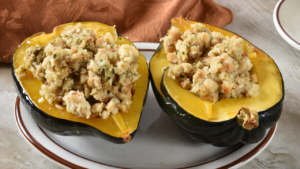
Cooking Tips
- For added phytoestrogens: Add a tablespoon of ground flaxseed to the stuffing before baking.
- To enhance sweetness: Drizzle a bit of honey or maple syrup over the stuffing before serving.
- Storage tip: Leftovers keep well in the fridge for up to 3 days.
Nutritional Facts (Per Serving)
- Calories: ~280
- Protein: 7g
- Fiber: 6g
- Healthy Fats: Rich in omega-3s from walnuts and pumpkin seeds.
- Carbohydrates: 40g (from grains, apple, and squash)
Drink Pairing
- Non-Alcoholic: Sparkling water with a slice of citrus or herbal iced tea.
- Alcoholic: A light Chardonnay or a sparkling rosé.
How This Recipe Supports Menopausal Health
This Menopause-Friendly Acorn Squash with Mixed-Grain Stuffing is packed with ingredients that promote hormonal balance and help alleviate common symptoms of menopause, such as fatigue, mood changes, and bone loss. Below are key components and their benefits:
Why This Dish is Ideal for Menopause
- Acorn Squash:
- Rich in beta-carotene, which converts to Vitamin A for skin health and immune function.
- Contains magnesium and potassium, essential for bone health and blood pressure regulation.
- Quinoa & Wild Rice:
- Provide complex carbohydrates to stabilize blood sugar and prevent energy dips.
- Quinoa is a complete protein, offering all essential amino acids needed for muscle maintenance.
- Whole grains are high in fiber, which supports digestion and helps control cholesterol.
- Walnuts & Pumpkin Seeds (Optional):
- Rich in omega-3 fatty acids, which help reduce inflammation and improve mood.
- Contain phytoestrogens, plant-based compounds that mimic estrogen, easing symptoms like hot flashes.
- Dried Cranberries & Apples:
- Offer antioxidants like polyphenols, promoting heart health and skin vitality.
- Help boost gut health with fiber, supporting digestion and hormone detoxification.
- Sage and Thyme:
- Sage is known for reducing the severity of hot flashes and night sweats.
- Thyme contains antioxidants that support immune function.
Additional Tips for Menopause-Friendly Cooking
- Include more plant-based proteins: Lentils, tofu, or chickpeas could be substituted for quinoa or added to other meals for additional benefits.
- Add ground flaxseeds: A tablespoon of flaxseed provides extra fiber and phytoestrogens, which mimic estrogen.
- Keep meals light and balanced: Eating smaller meals throughout the day helps prevent bloating and stabilizes mood.
- Hydration is key: Herbal teas like chamomile or peppermint not only hydrate but also soothe digestion and promote relaxation.
Cooking Tips for Best Results
- Caramelize the Squash: Roasting cut-side down ensures the squash develops a caramelized edge, enhancing sweetness.
- Prepare Grains in Advance: Cooking quinoa and wild rice beforehand saves time and allows the grains to absorb flavors.
- Stuff and Bake Right Before Serving: This keeps the squash warm and the stuffing flavorful.
- Storage Tip: Leftover squash and stuffing can be stored separately to prevent sogginess. Reheat the squash in the oven to maintain texture.
This dish provides a well-rounded nutrient profile that promotes energy, hormone balance, and long-term health, addressing many challenges that menopausal women face. It’s a satisfying, flavorful option perfect for a holiday spread or a weeknight meal.

